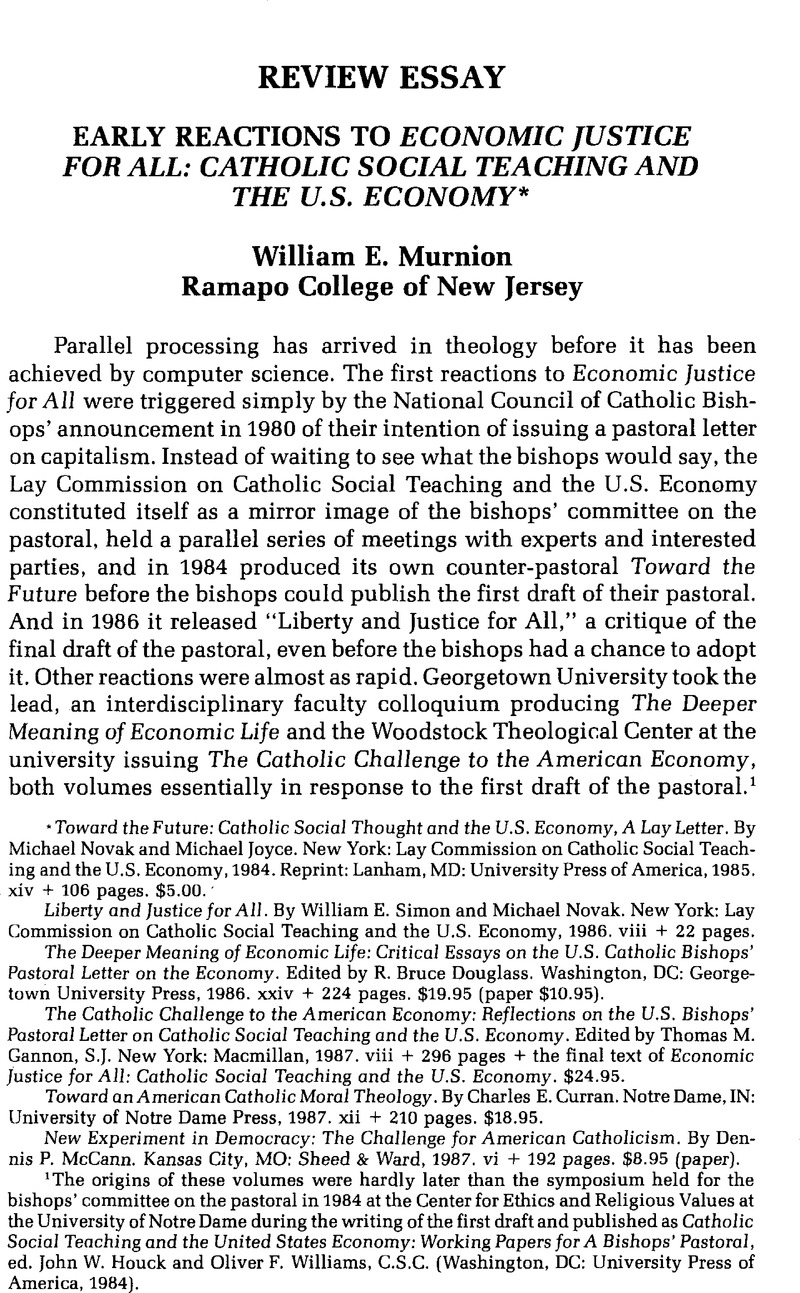No CrossRef data available.
Article contents
Early Reactions to Economic Justice for All: Catholic Social Teaching and the U.S. Economy*
Published online by Cambridge University Press: 09 September 2014
Abstract

- Type
- Review Essay
- Information
- Copyright
- Copyright © The College Theology Society 1988
Footnotes
Toward the Future: Catholic Social Thought and the U.S. Economy, A Lay Letter. By Michael Novak and Michael Joyce. New York: Lay Commission on Catholic Social Teaching and the U.S. Economy, 1984. Reprint: Lanham.MD: University Press of America, 1985. xiv + 106 pages. $5.00.
References
1 The origins of these volumes were hardly later than the symposium held for the bishops' committee on the pastoral in 1984 at the Center for Ethics and Religious Values at the University of Notre Dame during the writing of the first draft and published as Catholic Social Teaching and the United States Economy: Working Papers for A Bishops' Pastoral, ed. Houck, John W. and Williams, Oliver F. C.S.C. (Washington, DC: University Press of America, 1984)Google Scholar.
2 Other reactions to the pastoral are scheduled for publication in Gower, Joseph F., ed., Religion, Economics and the Social Order, Annual Publication of the College Theology Society, 31 (Lanham, MD: University Press of America, 1988)Google Scholar.
3 Building Economic Justice: The Bishops' Pastorai Letterand Toois for Action (Washington, DC: United States Catholic Conference, 1987)Google Scholar contains a readable version of the pastoral, together with a bibliography, index, discussion questions, and other aids for coming to an understanding of the pastoral.
4 Camp, Richard L., The Papal Ideology of Social fleform: A Study of Historical Development, 1878–1967 (Leiden: E. J. Brill, 1969)Google Scholar; Marie-Dominique, ChenuLa “doctrine sociale” de l'Eglise come idéologie (Paris: Les Editions du Cerf, 1977)Google Scholar; Gudorf, Christine, Catholic Social Teaching on Liberation Themes (Lanham, MD: University Press of America, 1980)Google Scholar; Dorr, Donal, Option for the Poor (Maryknoll, NY: Orbis, 1983)Google Scholar.
5 This is a point I have made in reference to The Challenge of Peace in “The American Catholic Bishops' Peace Pastoral: A Critique of Its Logic,” Horizons 13/1 (1986), 67–89CrossRefGoogle Scholar, and on a more general basis in “Foundation of Ethics,” Method: Journal of Lonergan Studies 5/2 (1987), 39–57Google Scholar.
6 For my own analysis of this topic, see “The ‘Preferential Option for the Poor’ in Economic Justice for All: Theology or Ideology?” in Prusak, Bernard P., ed., Raising the Torch of Good News: Catholic Authority and Dialogue with the World, Annual Publication of the College Theology Society, 32 (Lanham, MD: University Press of America, 1988)Google Scholar.
7 Cronin, John F., Social Principles and Economic Life (Milwaukee, WI: Bruce, 1959)Google Scholar; Calvez, Jean-Yves and Perrin, Jacques, The Church and Social Justice: The Social Teaching of the Popes from Leo XIII to Pius XII (1878–1958) (Chicago: Henry Regnery, 1961)Google Scholar.
8 Two recent books claiming such a policy is possible are Johnson, William Julius, The Truly Disadvantaged: The Inner City, the Underclass, and Public Policy (Chicago: University of Chicago Press, 1987)Google Scholar, and Blinder, Alan S., Hard Heads, Soft Hearts: Tough-Minded Economics for a Just Society (Reading, MA: Addison-Wesley, 1987)Google Scholar.




